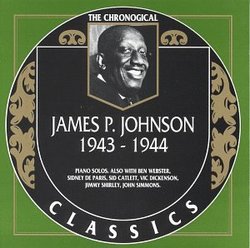| All Artists: James Johnson Title: James P Johnson 1943 1944 Members Wishing: 1 Total Copies: 0 Label: Classics Release Date: 6/9/1998 Genres: Blues, Jazz Styles: Swing Jazz, Traditional Jazz & Ragtime Number of Discs: 1 SwapaCD Credits: 1 UPC: 789368187027 |
Search - James Johnson :: James P Johnson 1943 1944
 | James Johnson James P Johnson 1943 1944 Genres: Blues, Jazz
|
Larger Image |
CD Details |
CD ReviewsEssential Stride Piano B. D. Tutt | London, UK. | 10/13/2001 (5 out of 5 stars) "This is another in the Classics review of the recordings of the great stride pianist James P. Johnson, and is probably the strongest of the series.In 1940, Johnson had suffered the first of the strokes which were eventually to end his career. By 1943 he had recovered and was playing again at something approaching his old skill, as these recordings demonstrate. Tracks one and two are from the series of sessions Johnson did for Asch. "Daintiness Rag" is given a stronger performance than the 1947 version, whilst the lyrical "Snowy Morning Blues" is superior to the 1944 Decca version. Tracks 3 - 10 are amongst Johnson's greatest solo recordings. Made for Blue Note in late 1943, they include two fashionable boogie - influenced improvisions, a lyrical performance of "Arkansas Blues" (which he had recorded in the early 1920s as a piano roll), and a solo version of his classic accompaniment to Bessie Smith, "Backwater Blues". However, the key performances are "Carolina Balmoral", "Mule Walk Stomp" and "Caprice Rag". All fast stride showpieces, Johnson delivers tour de force performances that indicate just what a formidable pianist he was. In particular, his improvisional ability is highlighted to great effect by the extended playing time Blue Note offered. Listen, for example, to the 22 choruses on "Carolina Balmoral". On "Mule Walk", the abrupt ending suggests that Johnson could have gone on for several minutes more. These are essential recordings.Tracks 11 - 12 were recorded three days after the death of Johnson's pupil Fats Waller, and "Blues for Fats" includes quotations from some of Waller's greatest hits. A more substantial tribute to Waller were the recordings Johnson made for Decca in 1944, and tracks 17 - 20 are the first installment of these. The bass is a little under-recorded, but they again offer wonderful examples of James P's improvisational ability. "Blue Turning Grey" in particular is a masterpiece of poignancy.Tracks 13 - 16 are band recordings by Johnson's Blue Note Jazzmen. Agian around four minutes long, they provide ample solo space for Ben Webster and Sidney de Paris. Johnson has a great solo on "After You've Gone".The solo tracks make this an essential purchase for lovers of stride piano."
|

 Track Listings (20) - Disc #1
Track Listings (20) - Disc #1